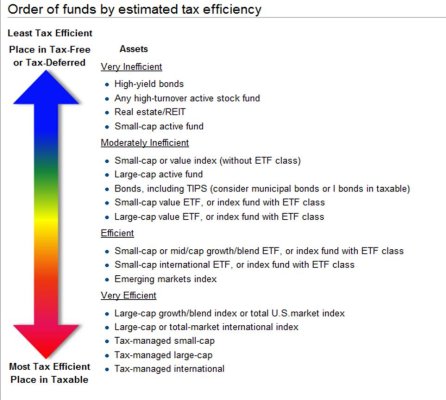Aiming_4_55
Thinks s/he gets paid by the post
Hi - 
Just looking for some feedback before I add to the Vanguard fund options in my taxable account. TIRA and Roth are/will be fully funded for the year.
I added a rental property in late 2010 and have been reinvesting the positive cashflow into overall improvements since closing. After monthly operating expense, I'll cashflow $1200 - 1800 per month and thinking of shifting this from my standard asset allocation (Vanguard passive funds, i.e. Target 2035 w/ small tilt of Small Cap & REIT, so 90 stocks/10 bonds).
and thinking of shifting this from my standard asset allocation (Vanguard passive funds, i.e. Target 2035 w/ small tilt of Small Cap & REIT, so 90 stocks/10 bonds).
I hope to reach FI in 6 - 8 years, with SER or ER when it feels right.
Thinking my allocation is fine, but a tad on the high side for stocks. So, I'm thinking this may be an attempt to lower stock holdings, so considering ...
a. 100% psst Wellesley
b. 50% psst Wellesley and 50% psst Wellington
c. 33% Wellesley, 33% Wellington, 34% Vanguard High Div. Yield Index fund
d. Stick with current asset allocation
e. Place in MM for down payment on next rental (possible, but it has to be a deal as landlording is a part time job)
Open to suggestions and ideas.... Thanks in advance.

Just looking for some feedback before I add to the Vanguard fund options in my taxable account. TIRA and Roth are/will be fully funded for the year.
I added a rental property in late 2010 and have been reinvesting the positive cashflow into overall improvements since closing. After monthly operating expense, I'll cashflow $1200 - 1800 per month
 and thinking of shifting this from my standard asset allocation (Vanguard passive funds, i.e. Target 2035 w/ small tilt of Small Cap & REIT, so 90 stocks/10 bonds).
and thinking of shifting this from my standard asset allocation (Vanguard passive funds, i.e. Target 2035 w/ small tilt of Small Cap & REIT, so 90 stocks/10 bonds).I hope to reach FI in 6 - 8 years, with SER or ER when it feels right.
Thinking my allocation is fine, but a tad on the high side for stocks. So, I'm thinking this may be an attempt to lower stock holdings, so considering ...
a. 100% psst Wellesley
b. 50% psst Wellesley and 50% psst Wellington
c. 33% Wellesley, 33% Wellington, 34% Vanguard High Div. Yield Index fund
d. Stick with current asset allocation
e. Place in MM for down payment on next rental (possible, but it has to be a deal as landlording is a part time job)
Open to suggestions and ideas.... Thanks in advance.


